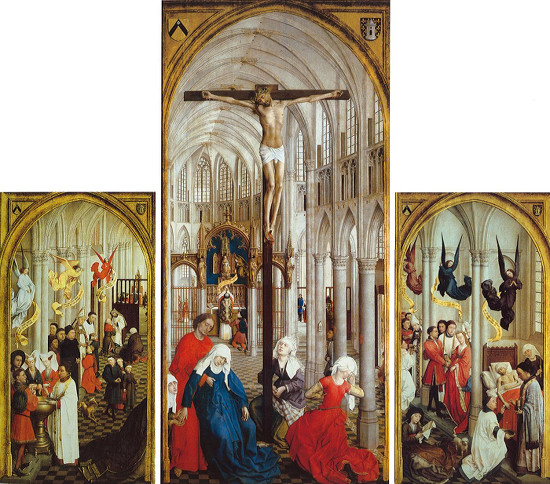|
Vicar's Musings for Ordinary Sunday 2304 September, 2016 The third in a series of musings on "Sacrament & Mission." The Lord's Supper, Eucharist, Holy Communion, the Mass: whatever name we give to it, this primary dominical sacrament lies at the very heart of our faith and mission. Perhaps for this very reason, it is a sacrament that has long divided as well as united us as Christians; it is human nature to argue about important things. Article XXVIII in the Book of Common Prayer (BCP) notes: "The Body of Christ is given, taken and eaten, in the Supper, only after an heavenly and spiritual manner" and "The Sacrament of the Lord's Supper was not by Christ's ordinance reserved, carried about, lifted up, or worshipped." And yet, as Catholic Anglicans, it is our long-held tradition to reserve the sacrament in the Tabernacle, to carry consecrated wafers to those who are sick, and at Benediction to lift up the host as a reminder of the real presence of Christ in the Mass. Why have Anglo-Catholics fought so hard to reinstitute and retain these ancient Eucharistic rituals and practices? Something of an answer for me personally lies in a pocket edition of The Imitation of Christ by Thomas A'Kempis (1380-1471) given to my grandmother by her father on the occasion of her first communion on 7th September 1913. When reading the fourth book of this devotional classic "Concerning Holy Communion" I can picture my 14 year-old grandmother devoutly preparing for her confirmation, and praying earnestly with A'Kempis: "Thanks be unto Thee, O merciful Jesu, Thou eternal shepherd, that Thou hast vouchsafed to refresh us, who are poor and in a state of banishment, with Thy precious body and blood, and to invite us to the receiving of these mysteries with the words even of Thine own mouth, saying, 'Come unto Me all ye that labour and are heavy laden, and I will refresh you.'" From an early age the sacrament of Holy Communion shaped the life and faith of my grandmother; and in turn it has shaped my mother, myself, my daughters and my grandchildren, not to mention the countless others we each have impacted through our faith. Eucharist is indeed important. It shapes and changes lives. It truly is "an outward and visible sign of an inward and spiritual grace" (BCP). In the final chapter of From the Abundance of the Heart (2008) Stephen Cottrell writes: "for catholic Christians there is nothing more authentic and nothing which shapes our life more than our participation in the Eucharist" (p. 120). It is a truth that so many people of faith across the ages have known: "In short, if you wish to shed all your defects, to be clothed with virtue and grace and to be led joyfully back to the source ... then make sure that you can receive the sacrament worthily and frequently. Thus you shall be united with him and made noble through his body" (Meister Eckhart Selected Writings, Penguin 1994, p. 35). The Rev'd Dr Hugh Kempster
Rogier van der Weyden, "Seven Sacraments" altarpiece (c. 1448) The Seven Sacraments Altarpiece was commissioned by Jean Chevrot, Bishop of Tournai (1436-1460) and one of the most important advisers of Duke Philip the Good. This powerful man is himself portrayed in the figure of the bishop performing the sacrament of confirmation to the left of the picture, and here looks very similar to his portrait in a miniature of 1448. Judging by the male fashions it shows, the Seven Sacraments Altarpiece may have been painted at about the same time. Rogier's task was to show both the seven sacraments and also the Crucifixion, the fundamental act of redemption. He solved the problem by moving the separate actions into a basilica with three naves. The side aisles provide room for the sacraments, shown simultaneously; only the most important sacrament, the Eucharist, is taking place in the central section at the altar. See source here... |
Views is a publication of |
|
Authorized by the Vicar
(vicar@stpeters.org.au) |

